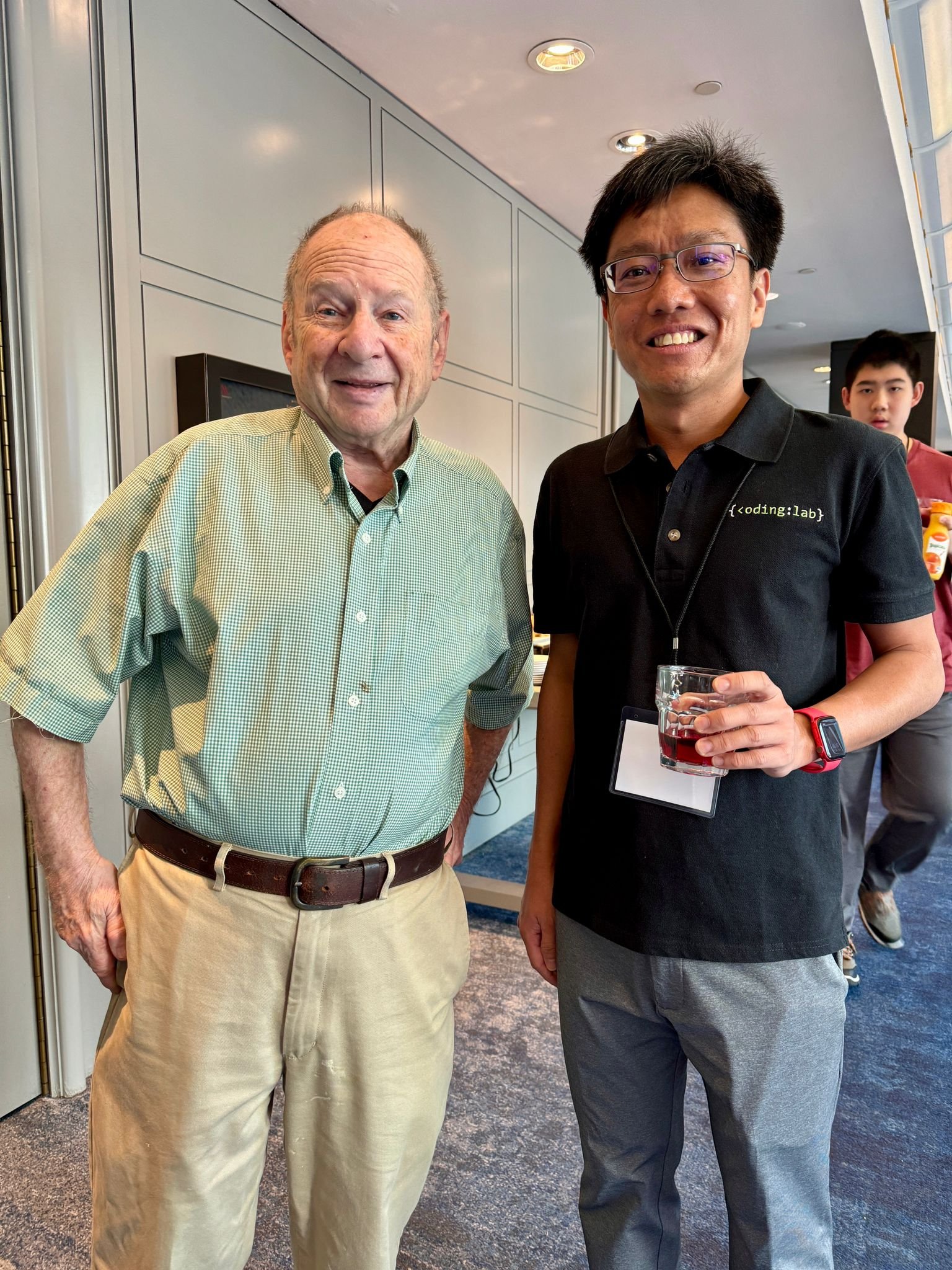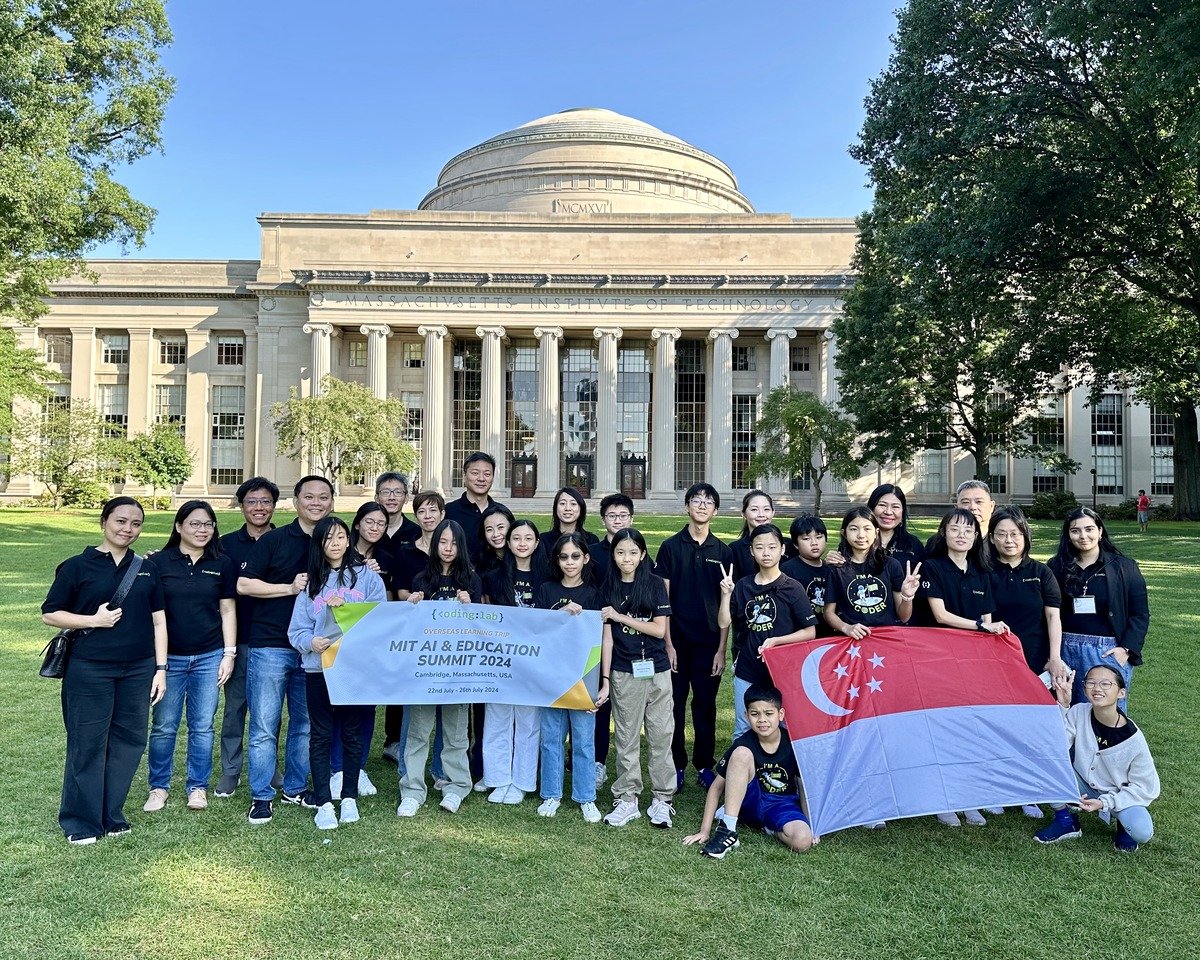From Singapore to MIT: How Coding Lab Students Achieved Global Success
Here is Yong Ning, our co-founder, with Professor Hal Abelson from MIT!
At the end of July 2024, Coding Lab was proud to announce that our brilliant #CodingLabStudents clinched the top prizes in various categories at the prestigious 2024 MIT AI & Education Summit! We had the chance to meet various experts at MIT, such as Professor Hal Abelson, and our co-founder, Yong Ning Foo, as well as our team, gained various insights from them.
Today, we present an exclusive interview with Yong Ning, our co-founder, as well as Yin Xuan, one of our educators who went to the Summit. They will be sharing more about his reflections from our achievements at the Summit and how Coding Lab had helped our students to gain such accomplishments on the global stage!
“This accomplishment is not the result of just a few weeks or months of effort, but rather years of dedication—starting from the basics of coding and progressing through continuous practice in computational thinking in our programmes.”
Hi, could you share your thoughts about our students clinching top prizes at the 2024 MIT Summit?
Yong Ning:
This recognition from a prestigious event like the MIT Summit is a moment of immense pride for our entire community. Our students, teachers, and the Coding Lab team have put in incredible hard work to reach this point. This accomplishment is not the result of just a few weeks or months of effort, but rather years of dedication—starting from the basics of coding and progressing through continuous practice in computational thinking in our coding programmes, particularly our Young Computer Scientists and Advanced Computer Scientists courses. These achievements are a testament to the strength of the Coding Lab curriculum and our unwavering commitment to excellence in both teaching and learning.
The team met various experts from MIT at the Summit. How do you feel about interacting with them? Did you gain any insights from them about programming and technology?
Here are all our brilliant #CodingLabStudents who were at the MIT AI & Education Summit 2024!
Yin Xuan:
Meeting the MIT experts was an exceptional opportunity. They not only provided valuable insights into programming and the latest technological trends but also gave us constructive feedback on how to further refine our students' projects. They opened our eyes to new possibilities and applications, some of which we hadn't considered before. Their guidance was both inspiring and practical, sparking fresh ideas on how we can push our work even further, while taking note of potential pitfalls of AI in education.
I heard that some of the MIT team were very interested in our students’ projects and even wanted them to publish it for others’ use. Could you share your thoughts about that?
Yin Xuan:
The MIT team’s interest in our students' projects was truly gratifying. They were particularly intrigued by the 3ACTs’ project on using vibration to track water use, especially how it could be adapted in the U.S., where water pipes burst due to extreme weather—an application we hadn’t considered in Singapore. It’s amazing to see our students' innovation recognised for its broader potential and impact.
We are now working closely with them to move from the initial prototyping phase to testing. Our goal is to refine their projects further, incorporating feedback and real-world considerations, hopefully reaching the stage of actual deployment. It’s an exciting journey, and it is good that our students are applying their knowledge in practical, impactful ways.
How did Coding Lab support our students in performing so well on the global stage at the Summit?
Yin Xuan:
The strong foundation our students gained from our App Inventor classes, as well as the Young Computer Scientists and Advanced Computer Scientists programmes, which are designed to progressively build their understanding of coding and computational thinking over time, played a crucial role. The brainstorming sessions and hands-on development of proof-of-concept ideas ensured that our students were well-prepared in both their projects as well as their teamwork and presentation skills. This holistic preparation gave them the confidence to excel in such a competitive environment.
Mark Friedman, the co-founder of the MIT App Inventor platform, was extremely interested in how our students' project and its practical applications in the US if it were published!
What do you think sets Coding Lab apart from other coding schools?
Yong Ning: What sets Coding Lab apart is our deep focus on Computational Thinking. We ensure that younger students build a strong foundation by sticking with platforms like Scratch and App Inventor before moving on. As an MIT graduate, I understand that to cultivate lifelong Computational Thinking skills, students need to solve progressively complex problems, rather than jumping between platforms. We also have an exceptional team of teachers, who are nurturing, inspiring, and highly knowledgeable. This combination of a solid curriculum and dedicated teachers truly sets us apart.
In terms of focusing on 1-2 key programming languages and going in depth, what benefits do we get from this?
Yong Ning: By focusing on just 1-2 key programming languages, students can bypass the constant need to relearn the basic syntax of various languages and dedicate more time to developing their Computational Thinking skills.
Computational thinking skills involve breaking down problems, recognizing patterns, focusing on key details, and creating step-by-step solutions. This helps students solve complex challenges logically and creatively. These skills are not only useful for programming but are also transferable to many other areas of learning and daily life.
This approach is similar to learning a musical instrument: rather than playing simple tunes like "Twinkle Twinkle Little Star" on multiple instruments, we aim to advance from basic pieces to more complex ones, such as sonatas and concertos, on a single instrument. We want to ensure students have the transferable skills to program anything they want no matter the platform, by advancing their knowledge in 1-2 key programming languages.
“The MIT team’s interest in our students’ projects was truly gratifying. They were particularly intrigued by our project and how it could be adapted in the U.S. It’s amazing to see our students’ innovation recognised for its broader potential and impact!”
Is learning programming languages any different from learning natural languages like English, Mandarin, etc.?
Yong Ning: Yes, learning programming languages differ from learning natural languages like English or Mandarin.
First, we need to recognize that a programming language is designed to give instructions to computers, while natural language is meant for communication between humans. Programming languages are aimed at solving problems and developing solutions, whereas natural languages are about expressing ideas, emotions, and complex meanings.
Thus, learning them involves different approaches:
For a programming language, the syntax is simply a means to an end. The goal is to learn the syntax quickly and move on to developing solutions to solve problems.
For a natural language, the focus is on the depth of vocabulary, phrasing, and nuances to effectively communicate.
Due to these differences, it is more important to learn the logical thinking behind a program so that students can independently code programs of high complexity, instead of memorising the syntax of various languages, which will hinder them from creating advanced programs on their own.
However, there are similarities between the two:
Both require consistent practice to achieve proficiency.
Both should emphasize real-world applications—programming to solve problems and natural language to communicate effectively.
Based on what happened at the Summit, what do you think about the future of technology?
Very proud of our amazing coders for their incredible hard work at the Summit! We are glad to see they learnt a lot through this experience.
Yin Xuan: The future of technology is something we cannot escape from—it’s becoming an integral part of our lives. Embracing artificial intelligence (AI) and other advancements is crucial. Students should not only learn about these technologies but also actively engage with them and leverage their potential. Of course, they should also be mindful of the potential biases and pitfalls of AI and consider these factors carefully when deciding on its deployment to ensure ethical and fair use.
By integrating AI and other emerging technologies into our daily routines and future projects, we can stay ahead of the curve, solve complex problems, and drive innovation. This proactive approach will help everyone, both students and educators, thrive in a tech-driven world and contribute meaningfully to its evolution.
What would you say to people who want to start coding, and/or are already in the midst of their coding journey?
Yin Xuan: If you’re just starting to learn coding, think of it like learning a new game—at first, it might seem tricky, but the more you play, the better you get! Start with simple projects and have fun experimenting with them. Don’t worry if you make mistakes; they’re just part of the learning process.
If you’re already into coding, keep exploring and trying new things, just like you would explore new levels in a game. Keep challenging yourself and learning new tricks. Remember, every mistake helps you improve, and working with friends can make coding even more exciting. Stay curious, keep having fun, and let your love for coding guide you on new adventures!
The 2024 MIT AI & Education Summit marked a significant milestone for Coding Lab, highlighting our students’ exceptional achievements and the strength of our curriculum. Their top prizes at this prestigious event underscore our commitment to excellence in coding education.
The insights gained from MIT experts will help us refine our programs and continue to inspire innovation. We’re excited to build on this success and keep empowering the next generation of tech leaders.
Thank you for celebrating this achievement with us. We look forward to more milestones and innovations ahead.
Coding Lab offers an award-winning curriculum specially for ages 5 to 18 – check out our courses to begin your own coding journey today!




